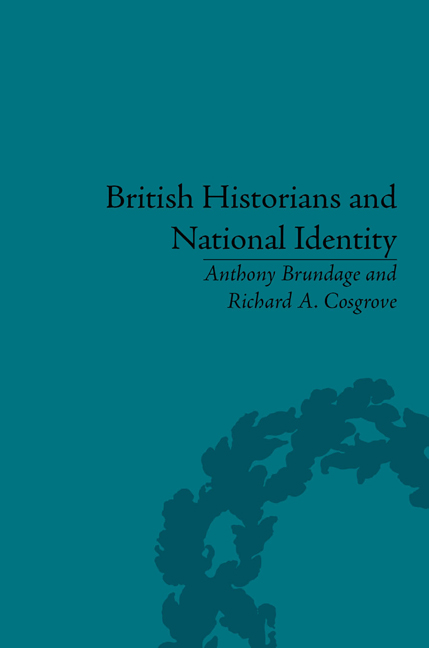Book contents
- Frontmatter
- CONTENTS
- Dedication
- Acknowledgements
- Introduction
- 1 Demythologizing the Nation's Past: David Hume's History of England
- 2 Catharine Macaulay's Vindication of Radicalism and the Republican Tradition
- 3 Reassessing Religion and the National Narrative: John Lingard and the English Reformation
- 4 Placing the Constitution at the Heart of National Identity: Henry Hallam and Constitutional History
- 5 Thomas Babington Macaulay: Writing the History of a Progressive People
- 6 The Glories of the Reformation and the Origins of Empire: J. A. Froude's Celebration of the Tudor Era
- 7 Edward Augustus Freeman: Liberal Democracy and National Identity
- 8 William Stubbs: The Continuity of English History as National Identity
- 9 Celebrating the People: J. R. Green's Short History
- 10 Samuel Rawson Gardiner: Incorporating Dissent into the National Story
- 11 In Thrall to English Tradition and Character: G. M. Trevelyan's Panoramic Histories of the Island Race
- 12 The Anglosphere as Global Model: Winston Churchill's History of the English-Speaking Peoples
- Conclusion
- Notes
- Works Cited
- Index
6 - The Glories of the Reformation and the Origins of Empire: J. A. Froude's Celebration of the Tudor Era
- Frontmatter
- CONTENTS
- Dedication
- Acknowledgements
- Introduction
- 1 Demythologizing the Nation's Past: David Hume's History of England
- 2 Catharine Macaulay's Vindication of Radicalism and the Republican Tradition
- 3 Reassessing Religion and the National Narrative: John Lingard and the English Reformation
- 4 Placing the Constitution at the Heart of National Identity: Henry Hallam and Constitutional History
- 5 Thomas Babington Macaulay: Writing the History of a Progressive People
- 6 The Glories of the Reformation and the Origins of Empire: J. A. Froude's Celebration of the Tudor Era
- 7 Edward Augustus Freeman: Liberal Democracy and National Identity
- 8 William Stubbs: The Continuity of English History as National Identity
- 9 Celebrating the People: J. R. Green's Short History
- 10 Samuel Rawson Gardiner: Incorporating Dissent into the National Story
- 11 In Thrall to English Tradition and Character: G. M. Trevelyan's Panoramic Histories of the Island Race
- 12 The Anglosphere as Global Model: Winston Churchill's History of the English-Speaking Peoples
- Conclusion
- Notes
- Works Cited
- Index
Summary
Overlapping T. B. Macaulay's History in dates of publication was one almost as popular, dealing with the heart of the Tudor era, from the middle of Henry VIII's reign to the latter stages of Elizabeth's. Its author, James Anthony Froude (1818–94), was born in Devon and educated at Westminster and Oriel College, Oxford. At Oxford, in part due to his elder brother Hurrell's influence, Froude fell within the orbit of the Oxford Movement, that Catholicizing trend within the Church of England that stressed the Church's antiquity, independence and ritual. John Henry Newman, the leading light of the movement, got Froude to undertake research for a planned book on the lives of the saints. The almost total lack of reliable evidence for the early centuries of Christianity fueled Froude's growing skepticism, precipitating his disengagement from the Oxford Movement and, for a while, from the Church of England itself. Developments in science, especially Robert Chambers's Vestiges of Creation (1844), caused Froude to question all dogmatic authority, and in 1848 he published his Nemesis of Faith. This ringing affirmation of the primacy of reason led to the loss of his Oriel College fellowship and the necessity of earning his livelihood. Froude turned his hand to writing historical sketches for various publications. His success with these pieces, together with an enduring interest in the exploits of the Elizabethan ‘sea dogs’ of his native county, led him to fasten upon history as the most suitable career.
- Type
- Chapter
- Information
- British Historians and National IdentityFrom Hume to Churchill, pp. 79 - 94Publisher: Pickering & ChattoFirst published in: 2014



